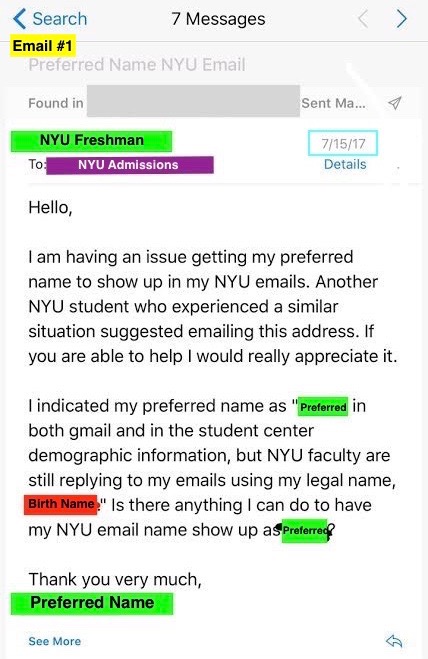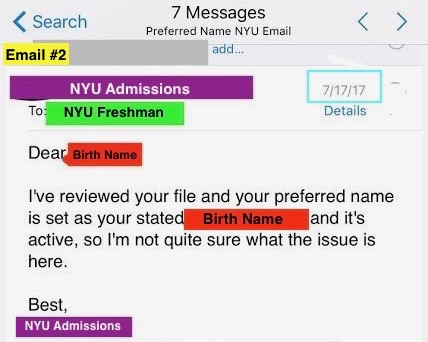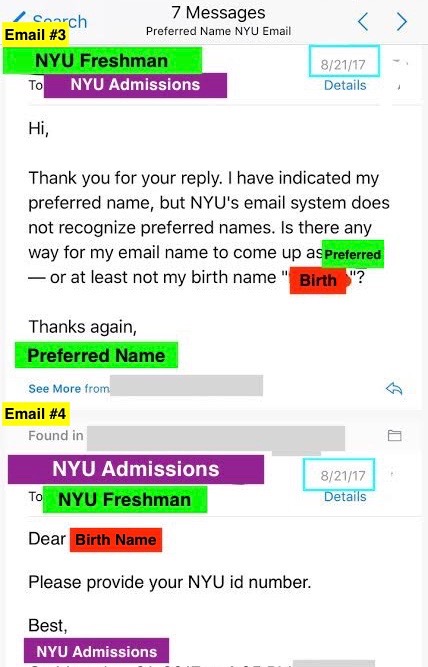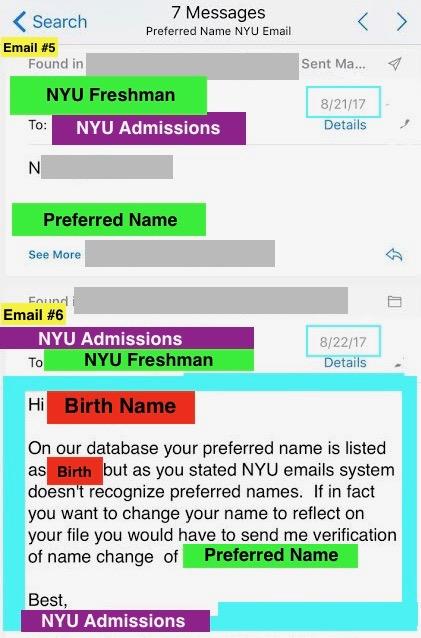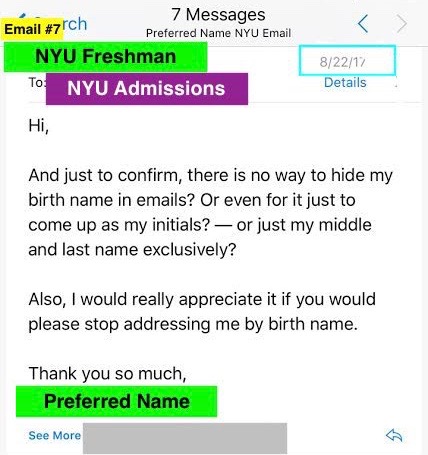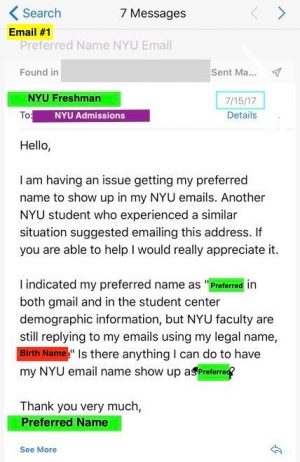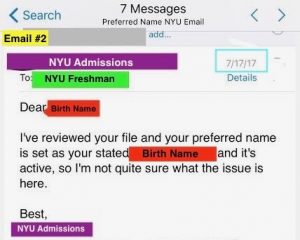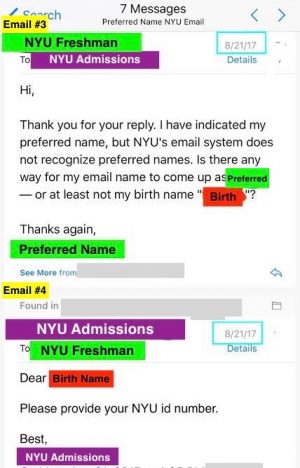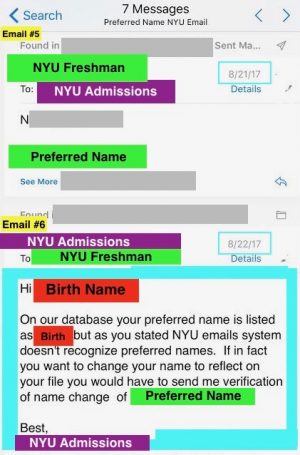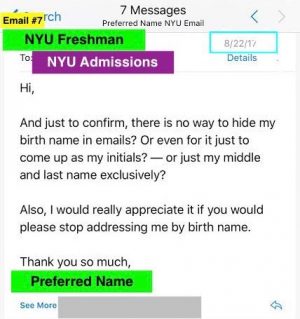Albert and NYU Gmail Sometimes Out Students as Transgender
September 25, 2017
Transgender students are sometimes misnamed and misgendered on platforms that rely on Albert and NYU Gmail, even after indicating their preferred name and gender identity within these systems.
Because Albert populates attendance sheets, some professors inadvertently misname, misgender and out transgender students on the first day of class. When NYU sends out mass emails, some students are addressed using a name they no longer identify with. Since NetIDs are unchangeable, they sometimes reflect a student’s former initials.
A Steinhardt freshman, who will remain anonymous in order to not be outed as transgender, said that his birth name was called out by multiple professors.
“I think the school could help students by being more responsive to complaints,” he said. “I also think teachers could help by letting students introduce themselves in class so that even if technological problems occur, students can avoid being outed to their peers.”
Some NYU administrators also fail to provide transgender students with the appropriate resources. For one NYU freshman, who will remain anonymous in order to not be outed as transgender, these problems began before he started school.
After struggling to make Albert and NYU Gmail reflect his preferred name and gender identity, the student emailed the Coordinator of Applicant Relations for Undergraduate Admissions. He was repeatedly misnamed and misgendered and falsely told that he would have to change his legal name — a $225 cost in his home state of Connecticut — in order for his preferred name and gender identity to be recognized.
WSN reached out to Coordinator of Applicant Relations for Undergraduate Admissions, but did not receive a comment.
The student said that since NYU has a reputation for being friendly to LGBTQ students, he was surprised that the Admissions employee continually misgendered him and did not address him by his preferred name.
“If she doesn’t know how to deal with preferred names, she could have referred me to somebody who does,” he said. “For this reason, there really isn’t any excuse — either she gave me misinformation out of bias, or she acted like she knew more than she did.”
Since the student could not resolve the issue, he was misgendered by professors and faculty who assumed that his name on NYU Gmail was correct. He also receives mass emails addressed to his birth name.
“I now avoid sending emails from my NYU address as much as possible,” he said. “Sometimes when I sign in for school events on a tablet outside the location, my birth name pops up and I feel like I have to quickly hide it before somebody over my shoulder sees it.”
Once school began, transgender students told him that it is possible to change his name and gender identity in NYU information systems.
“It’s taken me a long time to revisit this issue since my interaction with the Applicant Relations Coordinator,” he said. “After that incident, I gave up and thought that there was no way for my preferred name to appear on my email.”
The student approached his Residence Hall Director, who offered to meet with him and connect him with NYU Information Technology. As of Sept. 22, he believes that his email is working correctly.
While the student understands the admissions employee may have not been knowledgeable about preferred names, he thinks that the situation was avoidable. He submitted a Bias Response Line Form but has not received any follow-up.
“I still think that faculty who work with students should understand how to deal with diverse demographics,” he said. “I understand that the reasons that my birth name still appears in so many places are likely more technical or internal than they are political. But I wish it was an issue that was more prioritized.”
Some academics have argued that information systems, politics and social justice are inextricably related. In an essay published by Duke University Press, Utah Valley University Assistant Director of Institutional Effectiveness and Planning Jeffrey Alan Johnson argues that information systems have an obligation to reflect all of the people they serve.
“The technical structures of data systems embed political values and relationships,” Johnson said. “These, as much as any other form of political institution, are significant contributors to social injustices affecting groups like gender-nonconforming people.”
According to NYU spokesman John Beckman, admissions employees are required to undergo two training sessions before they interact with any students. These sessions address bias, review relevant data and literature and train employees for inclusive customer service.
Beckman said that this freshman’s experience with the Coordinator of Applicant Relations reflects human error, not a lack of commitment to respecting students.
“As with any administrator, there may be moments where their knowledge is less extensive about something outside their area of expertise,” Beckman said. “We apologize for any instances in which an applicant or an admitted student has been addressed by the incorrect name or gender or pronoun. But it was certainly not something intentional, and I believe it is a rarity.”
Some students have had no difficulties communicating with NYU administrators. Tisch freshman Jamie Paynton said that after being incorrectly named during attendance, his advisor helped resolve the issue.
“I just emailed [my advisor] to let them know about the name change since they initially referred to me by my birth name,” he said. “They emailed back apologizing and provided written instructions on how to change my name in Albert.”
Quinn Weirts, a freshman in Tisch, said that NYU professors could help by emailing students before class to clarify preferred names and pronouns.
Weirts said that while he wishes his NetID reflected his correct initials, and though he did not receive mass emails addressed to his birth name, his experience with Albert and NYU Gmail have not been terrible.
“It’s been better than I thought it would,” he said. “It’s not fantastic and has a long way to go, but it could be worse.”
Click here for information about how to indicate your preferred name and gender identity in NYU’s information systems.
Click here for information about NYU’s Transgender and Gender Non Conforming Process Group.
A version of this article appeared in the Sept. 25 print edition. Email Caroline Haskins at [email protected].























































































































































